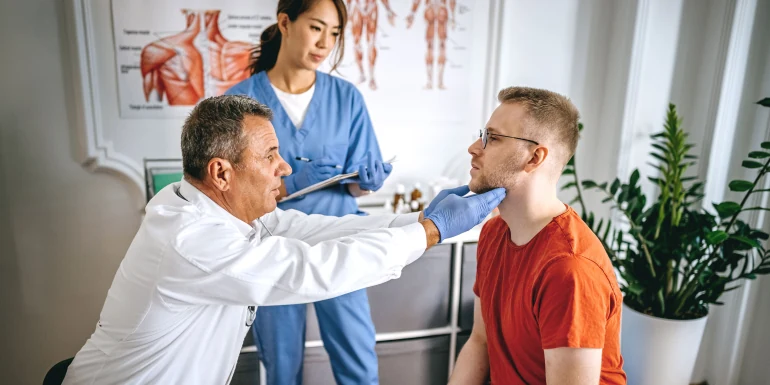
Hypothyroidism: causes, symptoms and treatment
What can you do if you have hypothyroidism? Does hypothyroidism during pregnancy affect the baby? Find out now about hypothyroidism, its symptoms in men and women, and how it is treated.
What is hypothyroidism?
In cases of an underactive thyroid (hypothyroidism), the thyroid gland is not producing enough hormones. A shortage of thyroid hormones slows the metabolism, resulting in a variety of symptoms.
An underactive thyroid at birth is known as congenital hypothyroidism. This condition affects roughly one child in every 3,000 to 4,000. However, most people with hypothyroidism develop it later in life. This is known as acquired hypothyroidism. Women are more commonly affected than men.
Hypothyroidism may have a genetic component in some cases. In other words, if several members of your family suffer from hypothyroidism, you are at greater risk of developing it yourself. You should consult your doctor if this applies to you, even if you are not experiencing any symptoms. They will arrange treatment if necessary.
Hypothyroidism: causes
Hypothyroidism can be triggered by a number of different factors. The list below provides an overview of the causes of hypothyroidism in women and men:
- Malformation of the thyroid gland
- Hashimoto’s disease
- Inflammation of the thyroid, for example caused by medication or infections
- Removal of all or part of the thyroid gland
- Long-term iodine deficiency
- Radioactive iodine therapy (consuming radioactive iodine, for example in cases of hyperthyroidism or thyroid cancer)
- Medications such as amiodarone, lithium or antithyroid medication
- Disorders of the hypothalamus or pituitary gland (rare)
- Being born without a thyroid gland (very rare)
Please note: there is no evidence that hypothyroidism can directly result from mental causes. Mental health issues may contribute to the development of Hashimoto’s disease, however.
Hashimoto’s thyroiditis is an autoimmune disease that causes the thyroid to become inflamed as the body’s immune system attacks its own thyroid. Symptoms of Hashimoto’s disease may include fatigue, constipation and difficulty concentrating. Hashimoto’s disease often leads to hypothyroidism. Hashimoto’s disease must be diagnosed by a medical specialist, who will do a blood test and perform an ultrasound scan. The thyroid hormone levels in the blood indicate whether the patient has hypothyroidism as a result of Hashimoto’s disease. Hashimoto’s disease is usually treated using hormone replacement therapy.
Hypothyroidism: symptoms
There are many potential signs of hypothyroidism. However, many of the symptoms aren’t noticeable unless the case of hypothyroidism is severe. So if you have mild hypothyroidism, it’s likely that you won’t notice any symptoms at all. The most common signs of hypothyroidism are:
- Swelling: hypothyroidism often causes facial swelling, particularly around the eyes. This is due to the build-up of carbohydrate compounds in the tissue.
- Reduced perspiration: people with an underactive thyroid sweat less.
- Throat problems: hypothyroidism is sometimes associated with throat problems such as hoarseness or swelling of the tongue.
- Goitre: in some cases of hypothyroidism, the thyroid becomes enlarged, resulting in the formation of a goitre.
- Weight gain: hypothyroidism affects a person’s weight, causing slight to moderate weight gain.
- Listlessness: people with hypothyroidism often feel tired, unproductive and weak.
- Poor concentration: affected persons often struggle to concentrate, and sometimes experience issues with their memory.
- Depressive moods: for some people, hypothyroidism can also change their character, making them apathetic and disinterested.
- Slow heart rate: people with hypothyroidism may have a slower heart rate and and low blood pressure.
- Dry skin: many people find that their skin becomes flaky, and the soles of their feet and palms of their hands turn yellowish-orange.
- Gastrointestinal complaints: people with hypothyroidism often suffer from constipation.
- Sensitivity to cold temperatures: many affected people find that they easily feel the cold.
- Loss of libido: hypothyroidism can sometimes cause erectile dysfunction in men. Women’s fertility may be affected.
- Irregular menstrual cycle: an irregular menstrual cycle is one symptom of hypothyroidism in women. This is often accompanied by heavy periods.
Important: you should consult your doctor if you experience any of these symptoms. Some of the symptoms of hypothyroidism, such as hoarseness, also occur with thyroid cancer. In most cases, however, this is not an indication of cancer, but rather some other illness.
Thyroid disorders are particularly common during and after the menopause. It is not always clear whether hypothyroidism is the root cause of the symptoms. Women often view symptoms such as dry skin, weight gain and fatigue as typical complaints associated with the menopause. This makes it all the more important to look out for the symptoms of potential hypothyroidism during the menopause. Take any symptoms seriously, and discuss them with your doctor.
Hypothyroidism: diagnosis
Talk to your GP if you notice the typical symptoms of hypothyroidism. A medical professional can assess whether a person does indeed have hypothyroidism using a thyroid function test. This determines the levels of the thyroid hormones TSH, FT4 and FT3. “TSH” stands for thyroid stimulating hormone, or thyrotropin, while “FT” is short for free thyroxine. The results differ depending on the form of hypothyroidism:
- Latent hypothyroidism: in cases of latent (subclinical) hypothyroidism, TSH levels are elevated but the levels of FT4 are normal.
- Manifest hypothyroidism: TSH levels are also elevated in cases of manifest hypothyroidism, while levels of FT4 are low. This is only true for some forms of hypothyroidism, however. There are also other forms that result in low TSH levels. Your doctor will know how to interpret the results.
The thyroid function test takes the form of a blood test, and the results are very informative. The blood test is usually followed by a TPO antibodies test, which is used to find out whether a person has Hashimoto’s thyroiditis or some other form of hypothyroidism. Your doctor may also perform an ultrasound scan.
People with overactive thyroids (hyperthyroidism) have low TSH levels. The levels of FT3 and FT4 are normal if hyperthyroidism is latent but elevated if it is manifest. The symptoms of hyperthyroidism differ from those of hypothyroidism. People with hyperthyroidism sweat more, for example, and their blood pressure is raised.
Hypothyroidism: what can you do?
With a few exceptions, hypothyroidism is incurable. Medical specialists usually treat hypothyroidism using L-thyroxine. This is a synthetic hormone that exactly replicates the T4 hormone produced by the body. L-thyroxine stimulates the metabolism of people suffering from hypothyroidism. Taking the hormone replacement properly and regularly eliminates the symptoms of hypothyroidism, making it easier to lose weight, for example. The way that hypothyroidism is treated is the same for men and women.
By the way, latent hypothyroidism doesn’t usually need to be treated provided you’re not experiencing any symptoms. But you should contact your doctor if you notice any signs of hypothyroidism. Latent hypothyroidism is treated if the affected person is pregnant or trying to get pregnant.
Hypothyroidism: consequences
Hypothyroidism has a number of different effects on the body, particularly if it is left untreated.
- Those affected often have increased cholesterol levels if their hypothyroidism is left untreated.
- Failing to treat your hypothyroidism may cause you to gain weight. You will find it impossible to lose weight owing to a lack of thyroid hormones.
- Arteriosclerosis is another consequence of untreated hypothyroidism. The blood vessels harden, and the risk of cardiovascular diseases rises.
- Untreated hypothyroidism may lead to infertility in both women and men.
- Depression is also a potential consequence of leaving an underactive thyroid untreated.
- In rare cases, untreated hypothyroidism can lead to a condition known as myxedema coma. Myxedema coma is life-threatening, and its symptoms include disorientation, shortness of breath, seizures and puffiness or swelling of the skin on the face and hands.
The symptoms of hypothyroidism during pregnancy are the same as at any other time. If you already suffer from a thyroid disorder, diabetes, an autoimmune disease or excess weight, your risk of developing hypothyroidism during or immediately after pregnancy is greater. You should therefore talk to your doctor about your risk of developing hypothyroidism during pregnancy.
When does hypothyroidism during pregnancy become a risk? If hypothyroidism is not diagnosed until late in the pregnancy, there is an increased risk of premature birth or miscarriage. A thyroid condition in a pregnant woman can do significant damage to her unborn child.
If you already have hypothyroidism, your doctor should ideally test your blood regularly and adjust your hormone replacement therapy as necessary. This is because you need more thyroid hormones when you are pregnant. It is therefore important to take hormone replacement tablets during this time even if you only have latent hypothyroidism.
Preventing hypothyroidism
Hypothyroidism cannot be prevented in most cases, but there are effective treatments available for it. You should therefore take any potential symptoms seriously, and talk to your doctor if you notice any signs of hypothyroidism. That way, you will get reliable support at an early stage.
The expert provided the editorial team with advice and input for this article. Dr Roman Trepp is Head of Endocrinology at the University Hospital of Bern’s Department of Diabetes, Endocrinology, Nutritional Medicine and Metabolism (UDEM).


Newsletter
Find out more about current health issues every month and get all the information you need about our attractive offers from all Helsana Group companies * delivered by e-mail to read whenever it suits you. Our newsletter is free of charge and you can sign up here:
We did not receive your information. Please try again later.
* The Helsana Group comprises Helsana Insurance Company Ltd, Helsana Supplementary Insurances Ltd and Helsana Accidents Ltd.